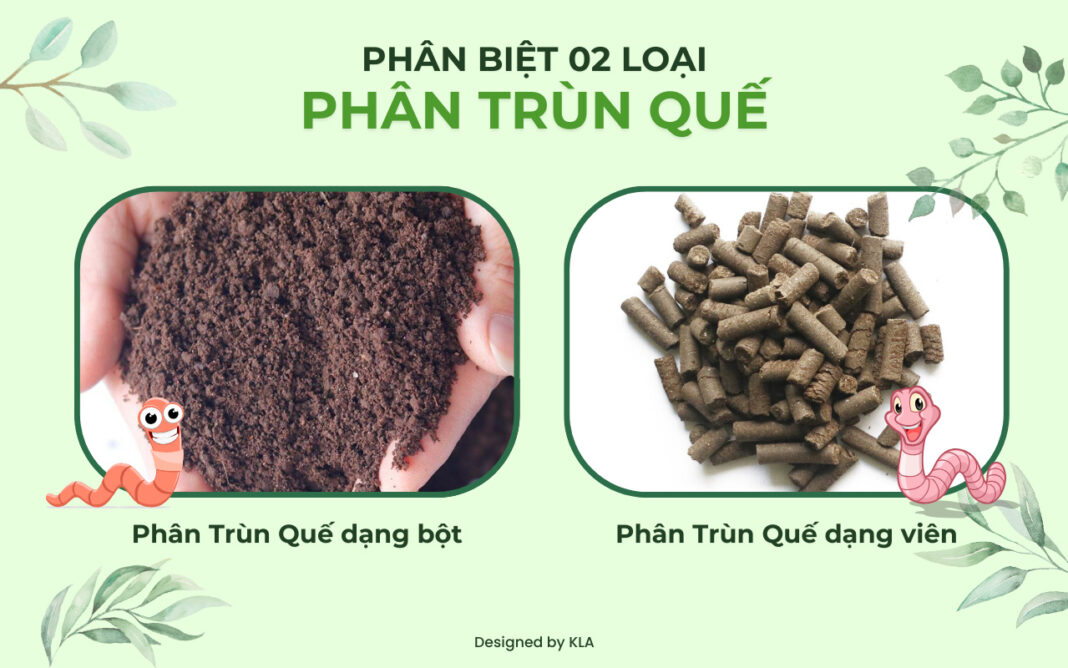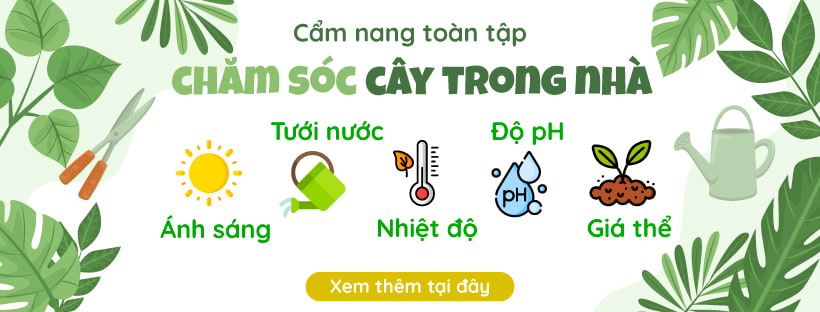Vermicompost is a natural organic fertilizer that is loved by many people who grow ornamental plants. With the ability to provide comprehensive nutrition and be environmentally friendly, vermicompost is an ideal choice for both beginners and long-time gardeners.
However, there are two popular forms of vermicompost on the market today: powder form và tablet, each type is suitable for specific usage needs. Explore the characteristics of each type with KLA to choose the most suitable one for your garden!
What is vermicompost?
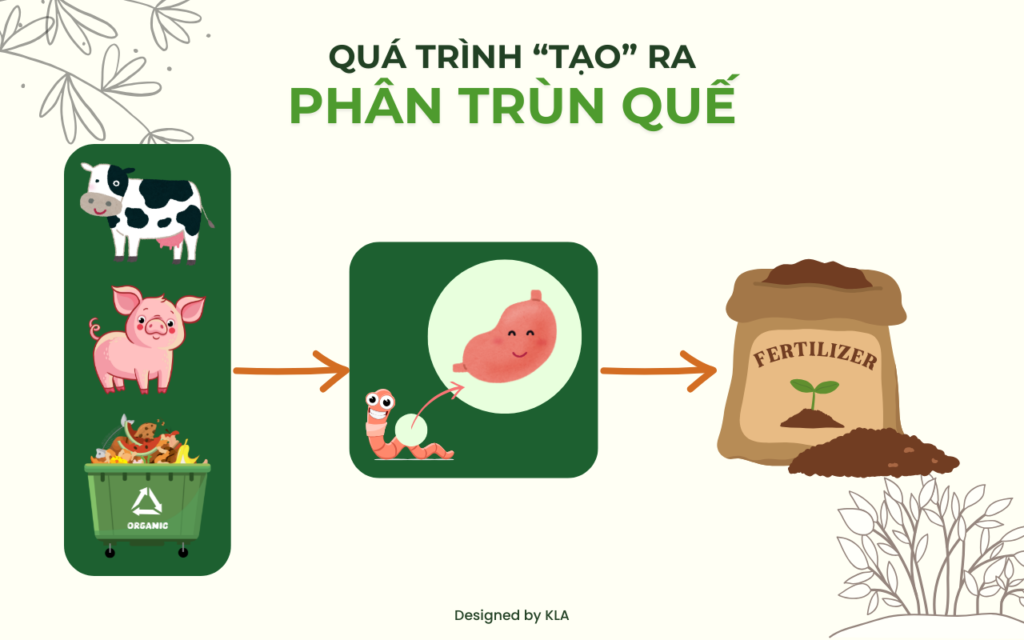
Vermicompost is created from the digestion and excretion process of earthworms (Perionyx excavatus), when they eat organic matter such as cow manure, pig manure, or decomposed organic humus. This product is not only nutritious but also safe, harmless to plants and the environment.
How is vermicompost different from other organic fertilizers?
The finished vermicompost has completely decomposed, so the nutrients in the compost are in a form that is easily absorbed by plants (ie, plants can absorb them immediately after fertilization). This is completely different from other organic fertilizers.
“easily absorbed by plants”
In addition, because the finished compost has decomposed, it does not have a strong or foul smell like chicken or cow manure. Therefore, vermicompost is friendly to the living environment.
Origin of vermicompost
Completely natural origin and does not contain toxic chemicals. Therefore, vermicompost has a natural earthy smell, does not cause discomfort and is considered by users to be harmless to plants and the environment.
Nutritional composition
The nutritional composition of vermicompost is diverse in essential minerals for the growth of plants with balanced content. Depending on the input materials and production method, the minimum nutritional content includes:
NPK macronutrients
- Nitrogen (N): about 1.5-2.0% helps plants develop leaves and stems.
- Phosphorus (P): about 1.0-1.5% supports root formation and stimulates flowering and fruiting.
- Potassium (K): about 1.2-1.8%, enhances resistance and helps plants grow healthily.
Organic matter
Vermicompost contains at least 20-25% of organic matter, helping to improve the soil, increase humus, make the soil loose and increase water retention capacity.
Trace elements
A variety of micronutrients are necessary for the structure and development of plants:
- Calcium (Ca): Helps plants form a strong cell structure.
- Magnesium (Mg): Promotes photosynthesis.
- Iron (Fe), Manganese (Mn), Zinc (Zn), Copper (Cu): These trace elements participate in plant metabolism and enzymes.
Beneficial Microflora
“Vermicompost contains a large amount of beneficial microorganisms”
Vermicompost contains a large amount of beneficial microorganisms such as cellulose-decomposing bacteria, nitrogen-fixing bacteria, and phosphorus-decomposing bacteria, which help:
- Increase the ability to decompose organic matter in soil/substrate.
- Provide easily absorbed nutrients for plants.
- Promotes root growth.
Humic Acid and Fulvic Acid
These two natural growth stimulants help:
- Enhances the plant's ability to absorb nutrients.
- Improves soil pH and structure.
- Promotes plant root growth.

Neutral pH
Vermicompost has pH neutral (about 6.5-7.0), suitable for most crops, does not change the properties of soil/planting medium.
Benefits from nutritional ingredients:
- Increase productivity and quality of agricultural products.
- Helps plants grow evenly and sustainably.
- Makes soil loose and nutritious without causing negative impacts on the environment.
- Full of macronutrients (N, P, K) and micronutrients in moderate amounts, necessary for plants.
- Through the digestion and excretion process of earthworms, nutrients are in ion form so plants can absorb them immediately.
- Rich in humic acid and beneficial microorganisms that help stimulate root growth and improve soil structure.
- High humus content, increases porosity and retains moisture for soil and growing medium.
Benefits of using vermicompost when planting trees and gardening
Vermicompost is one of the good organic fertilizers, bringing many benefits to plants and gardening activities:
- Provides natural and complete nutrition to help plants grow evenly from the vegetative stage to flowering. Increases the plant's ability to photosynthesize and metabolize.
- Make the soil and growing medium loose and airy to help the roots grow easily. Increase the ability to retain water and nutrients of the soil and growing medium.
- Provides beneficial microorganisms, supports organic matter decomposition and improves humus.
- Stimulates strong root growth with humic and fulvic acids. Stronger roots increase nutrient and water absorption, helping plants withstand drought and grow faster.
- Beneficial microorganisms in vermicompost inhibit the growth of harmful fungi and bacteria in the soil, improving the resistance of crops.
- Vermicompost is suitable for most plants including ornamental plants, vegetables, flowers, indoor ornamental plants and foliage plants.
- Vermicompost is completely organic, contains no toxic chemicals, and is safe for plants, users and pets.
- Economical and long-term effective because nutrients in soil and substrate last longer than chemical fertilizers, helping to save fertilizer costs.
Distinguishing between vermicompost powder and pellets
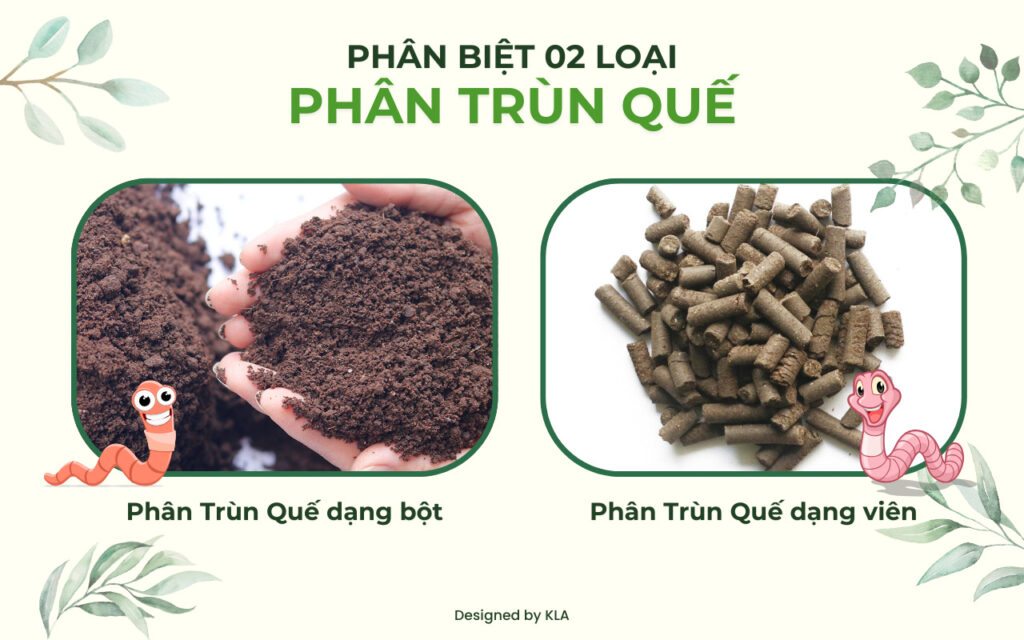
Both are worm castings of completely natural origin. However, they are produced in fine powder or cylindrical pellet form to suit each group of plants and the purpose of use of the user.
Below is a table distinguishing two types of earthworms to help you easily choose the right type of fertilizer for your home garden.
When should you use each?
Depending on the type of bonsai, foliage or care conditions, you can choose the most suitable powder or pellet form.
Tips for using vermicompost effectively
Mix vermicompost into the substrate
Mix vermicompost powder with soil, growing medium, coconut fiber, burnt rice husk or peat in a ratio of 3 parts soil/growing medium: 5 parts other organic growing medium: 2 parts vermicompost.
Use as mulching
Spread a thin layer of powdered vermicompost (about 1-2cm) on the surface of the pot around the base of the bonsai, then cover with a thin layer of soil and substrate to prevent the vermicompost from being exposed to direct sunlight, which reduces the moisture in the compost and makes microorganisms less active.
Fertilize with vermicompost regularly
Fertilize 1-2 times/month depending on the plant's nutritional needs. Amount of fertilizer:
- Small plants (in small pots): 100-150g of vermicompost powder/pot or 1-2 handfuls of vermicompost pellets/pot.
- Large plants (in large pots): 200-300g of vermicompost powder/pot or 3-4 handfuls of vermicompost pellets/pot.
Notes when using vermicompost for ornamental plants
- Do not over-fertilize, especially with plants that prefer poor soil like cacti and succulents.
- Store vermicompost in a cool, dry place to maintain best quality.
Top 3 reputable vermicompost products today
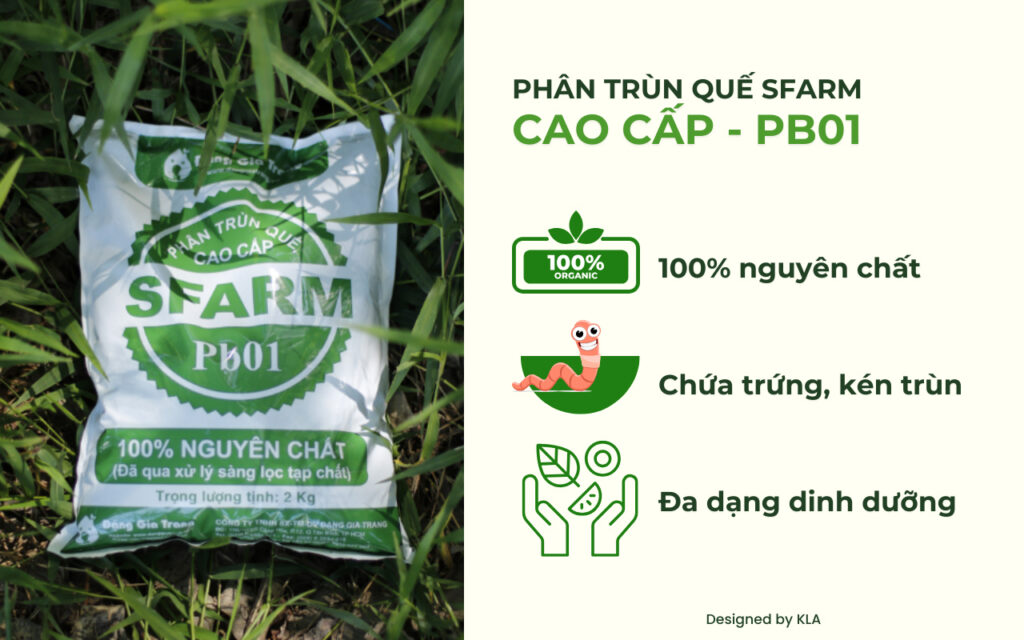
1. SFARM Vermicompost
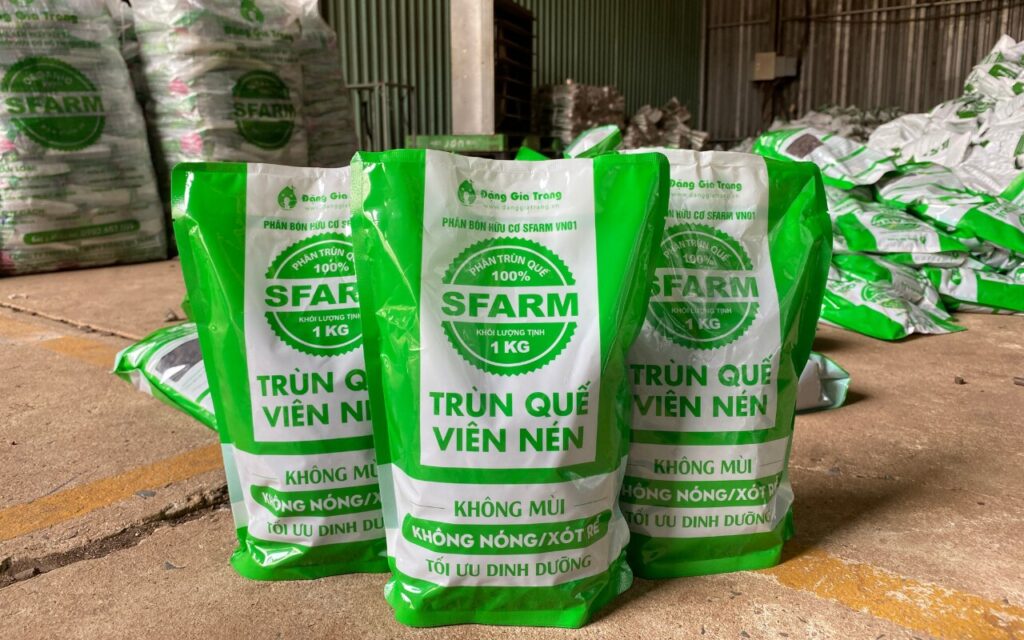
SFARM is the leading vermicompost brand in Vietnam with over 12 years of experience. The product 100% is pure, produced from scientific food fermentation process, optimize nutrition for plants.
SFARM provides a variety of products such as organic fertilizers, microbial preparations, substrate, SFARM molasses, eggshells, providing a comprehensive solution for plant care needs. Currently, SFARM has two fertilizer lines suitable for ornamental plants and bonsai, helping plants grow green and sustainable.
2. Tropical Premium Vermicompost
Tropical Premium provides premium vermicompost, naturally dehumidified and carefully screened. Tropical Premium vermicompost is suitable for export farms and growing clean vegetables at home in powder form.
3. SHA Vermicompost
The product is manufactured, packaged, preserved and distributed by SHA Vietnam Joint Stock Company. SHA vermicompost is in powder and tablet form, pure, stable moisture, used to fertilize flowers, ornamental plants, clean vegetables at home... especially suitable for roses and orchids.
Whether in powder or pellet form, vermicompost provides high nutritional value and is safe for ornamental plants and foliage. By understanding the characteristics and applications of each type, you will be able to take care of your garden most effectively. Choose the right product and enjoy the joy of growing green plants!
Frequently asked questions (FAQ) about vermicompost:

Is vermicompost suitable for all plants?
Vermicompost is suitable for most plants thanks to its natural nutrients and beneficial microorganisms. However, the level of suitability will depend on the characteristics and nutritional needs of each plant. Here is a detailed review:
1. Plants suitable for vermicompost
- Vegetable and leafy vegetables: Green vegetables such as mustard greens, spinach, lettuce, herbs, and chard do well with vermicompost.
- Fruit trees: Trees such as oranges, lemons, grapefruits, mangoes, jackfruits, and dragon fruits absorb nutrients well from vermicompost.
- Flowers and ornamental plants: Very suitable for flowers such as roses, chrysanthemums, orchids, gerberas or ornamental plants such as bonsai, money tree, and snake plant.
- Food and industrial crops: Vermicompost is suitable for rice, corn, coffee, pepper, tea, or sugarcane.
- Indoor plants: Vermicompost is very safe for indoor plants (sedum, cacti, aquatic plants) because it is odorless and contains no chemicals.
2. Plants that need caution when using vermicompost
- Plants prefer poor soil
- Plants like cacti, succulents, or succulents do not need much fertilizer.
- Use only low doses of vermicompost (mix about 10-20% of vermicompost into the substrate) to avoid excess nutrients causing root rot.
Does vermicompost smell?
Vermicompost has virtually no unpleasant odor. This is one of the outstanding advantages, making vermicompost an ideal choice for both indoor and outdoor plants.
How to know if vermicompost is of good quality?
To know if your vermicompost is of good quality, you can rely on some important criteria such as color, smell, texture, and nutritional composition. Here are some factors to consider:
1. Color and shape
- Color: Quality vermicompost is usually dark brown or light black, similar to the color of organic-rich humus.
- Fertilizer particles: Small, even, loose and not lumpy. This is a sign of complete digestion and excretion from earthworms.
2. Smell
- No bad smell: Quality vermicompost has a natural, pleasant, non-irritating smell of moist soil.
- If there is a foul odor, it could be a sign of impurities or incomplete processing.
3. Structure
- Soft and fluffy: Fertilizer can be easily spread evenly on the soil or mixed into the substrate without clumping.
- No impurities: Qualified manure will not contain animal carcasses, large debris or non-biodegradable waste.
4. Nutritional composition
Quality vermicompost contains all the essential nutrients for plants:
- High organic matter (over 20-30%): Helps improve soil and provides long-term nutrition.
- Macronutrients (N, P, K): Substances such as Nitrogen (N), Phosphorus (P), and Potassium (K) are usually present in a ratio of about 1-3% each.
- Beneficial microorganisms: Help increase soil vitality and improve plant nutrient absorption.
5. Humidity
- The ideal moisture content of vermicompost is about 30-40%.
- The manure should not be too dry (easily crumbles into powder) or too moist (easily clumps and has an unpleasant odor).
6. Contains no pathogens or chemicals
- Standard vermicompost will not contain pathogens, harmful bacteria or heavy metals.
- The product should also not contain chemical fertilizer residues, as this can affect plant health.
7. Quality certification
- Clear origin: Manufactured by reputable, branded facilities.
- Quality certification: Product meets safety and organic standards (if applicable).
- Labeling: The packaging contains complete information about ingredients, instructions for use, and contact information of the manufacturer.
8. Real-world testing
- Test plant: If the plant grows healthy, has green leaves, strong roots and no pest problems, then the vermicompost is of good quality.
- Water retention: Good vermicompost can retain moisture in the soil longer, helping plants avoid drought.
Where can I buy vermicompost?
1. Buy directly at the store
- Agricultural and gardening supply stores: Stores that specialize in fertilizers, seeds, and agricultural supplies, such as the Agricultural Supply chain, often carry vermicompost. You can ask for products from popular brands such as SFARM, Guilin, or SHA.
- Local vermicompost farms: Vermicompost farms or vermicompost production facilities often sell their products directly, at reasonable prices. You can find them in rural areas or call ahead before you go.
2. Buy online on e-commerce platforms
- Major e-commerce platforms in Vietnam such as: Shopee, Lazada, Tiki: There are many brands of vermicompost with diverse prices and capacities.
- Official online stores: Some brands such as SFARM, Que Lam, or Vietnamese Worms have official stores on these platforms.
- Pros: Save time, easily compare prices and read reviews from other customers. Home delivery, convenient for busy people.
3. Buy from manufacturers and distributors
Reputable brands:
- SFARM: Specializes in providing vermicompost and growing media, with a nationwide dealer system.
- Guilin: One of the long-standing brands of organic fertilizers, with branches in many provinces and cities.
- SHA: A prominent brand with vermicompost in pellet and powder form.
Official website: You can buy directly from the website or contact us to find the nearest dealer.
4. Notes when buying vermicompost
- Check the origin: Choose to buy products with clear labels, manufacturer information and expiration date.
- Price comparison: The price of vermicompost usually ranges from 10,000 - 20,000 VND/kg, depending on the brand and region.
- Ask for advice from someone with experience: Ask friends, acquaintances or the gardening community for advice on where to buy from.


